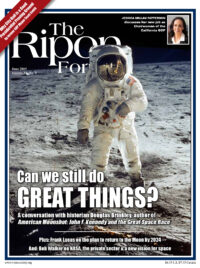
Fifty years ago, a young generation of Americans witnessed first-hand mankind’s most awe-inspiring achievement of the twentieth century. Broadcast live from over 200,000 miles away and featured on the front page of every newspaper was the iconic image of Neil Armstrong standing on the surface of the Moon. Now that the Space Race is well in the rearview mirror, does this younger generation maintain a similar intrigue in extraterrestrial exploration and discovery as their parents and grandparents?
To answer this question, you have to look back at public opinion in the 1960s-70s during the genesis of NASA’s global dominance—the Apollo program. This initiative was the catalyst that shifted the U.S. space program from a political exercise to being at the forefront of scientific discovery. The public must have been crying out for more funding and further investment, right? Not at all.
In 1973, the US was coming off of a rapid-fire series of six manned missions to the surface of the Moon. Instead of finding overwhelming support for national spending on the space program, the annual General Social Survey found that 59% of Americans said too much was being spent on our space exploration program, and among 18-34 year-olds, that number was 55%. Only 9% of the young Baby Boomer generation responded by saying too little was being spent on space exploration, while one quarter of them believed that spending was about where it should be.
According to a Pew survey conducted last year, 70% of Millennials say it is essential for the U.S. to remain a world leader in space.
Although the space age had finally arrived in the United States, there were concerns held by the public that tarnished NASA’s work. Cynicism was fed by the end of the Vietnam conflict—which cost taxpayers $1 trillion in today’s dollars—the oil crisis, and the western world entering a recession, bringing high inflation and high unemployment. It was difficult to sustain the infatuation of space exploration as sobering realities of economic hardship grew each day. Over time public opinion shifted to support more funds being directed toward space-related initiatives, but the assertion that the children of the 1960’s had an inherent captivation and support for expanded exploration is rather baseless.
Millennials are generally defined as being born between 1981 and 1996, and came long after the final manned Moon landing in 1972 and the years when NASA’s missions were broadcast live on nationwide television. Despite growing up long after the Space Race of the mid-twentieth century, they were able to experience their fair share of space-related breakthroughs.
The Space Shuttle program began its thirty-year mission in the 1980s, making possible the iconic missions such as Spacelab, the Hubble Space Telescope, the International Space Station, as well as launching satellites and unmanned spacecraft sent to study the outer limits of the solar system. More recently, in early 2016, scientists detected gravitational waves from the merger of two black holes 1.3 billion light years away, and on April 10, 2019, NASA announced the first-ever image of a black hole—both events confirming the century-old predictions of Albert Einstein’s general theory of relativity.
With this in mind, it should not be surprising that Millennials are, in fact, no different than Boomers when it comes to their present support and approval of U.S. participation in global space initiatives. According to a Pew survey conducted last year, 70% of Millennials say it is essential for the U.S. to remain a world leader in space, compared to 73% for Gen Xers and 71% for Baby Boomers. When it comes to whether the space station has been a good investment, 88% of Millennials say it has compared to 78% and 75% for those of the Generation X and Boomer generation respectively.
Even though their generation sees another manned mission to the Moon as less of a priority, Millennials place a higher importance on climate monitoring, scientific research, and sending astronauts to Mars.
Furthermore, Millennials seem to be more enthusiastic about the newer aspects of space exploration. For example, 63% of Millennials say they are “definitely or probably” interested in space tourism—something which some experts anticipate becoming a $23 billion industry within the decade and having its first trips in the next couple years. The level of interest among Gen Xers and Baby Boomers comes in at a meager 39% and 27%. Additionally, even though their generation sees another manned mission to the Moon as less of a priority, Millennials place a higher importance on climate monitoring, scientific research, and sending astronauts to Mars than older Americans.
Private companies are taking note and are now spearheading their own space exploration initiatives. Seeing abundant potential on the horizon, SpaceX, Blue Origin, and Virgin Galactic are private sector leaders in what some have dubbed the “billionaire space race,” and are heavily investing in technological development and acquiring resources to take advantage of the new consumer-driven space age of the twenty-first century. Acting independently from NASA, these companies are seeking to take mankind into a new era of frequent, affordable, and boundary-pushing space exploration.
Millennials differ from previous generations in seemingly every way – demographically, politically, and professionally – but to assume that space exploration has gone out of fashion with young Americans would be unjustified. Not only are they picking up where other generations left off, but their expectations for space exploration are the most ambitious this country has seen.
Kyle Chance is the Deputy Editor of The Ripon Forum.




